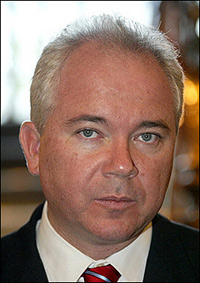 |
 |
 |
 Business News | January 2006 Business News | January 2006  
Venezuela Stocks Fell the Most in 2005 on Chavez's Policies
 Bloomberg Bloomberg


| | Venezuela's energy minister Rafael Ramirez, seen here in April 2005, said the government was preparing to take over an oil operation of US-based ExxonMobil and Spain's Repsol on January 1 if the US firm refuses to accept new terms for foreign oil companies.(AFP/Miguel Rojo) |
Venezuela's IBC stock index fell the most among the world's primary equity benchmarks this year on concern President Hugo Chavez will divert profits from investors as he seeks to redistribute wealth to the country's poor.

The Caracas Stock Exchange index fell 32 percent, the biggest decline among 78 world indexes tracked by Bloomberg. Of the index's 16 members, steelmaker Siderurgica Venezolana Sivensa led losers, falling 50 percent to 41.5 bolivars. The index today rose 170.41, or 0.8 percent, to 20,394.83.

"Investors are just leery about investing in the economy for the long term, given the economic policies being implemented," said Miguel Octavio, executive director of brokerage BBO Servicios, in Caracas.

Chavez, who was elected in 1998 and survived a recall vote last year, says capitalism breeds poverty and class inequality. This year the 51-year-old leader seized farm estates as part of an effort to promote worker cooperatives. His purchases of arms from Spain and Russia prompted U.S. Defense Secretary Donald Rumsfeld to brand him a destabilizing force. Chavez also led opposition at a summit in Argentina to a U.S.-backed free-trade proposal.

Of the 16 shares comprising the index, 12 fell, three rose, and one stayed unchanged. Average daily volume was about $1.1 million this year, compared with $2.6 million in 2004.

The index fell 7.3 percent on April 22, the biggest decline of the year, when the government began negotiations with oil companies operating fields for state oil company Petroleos de Venezuela SA. The companies were given a deadline of Dec. 31 to convert their contracts to joint ventures in which Petroleos de Venezuela would hold a majority stake.

Reversal

The index fell in part because investors were selling to take advantage of high prices after three years of gains, including a 34 percent run-up in the index in 2004, said Nelson Ortiz, president of the Caracas Stock Exchange.

"We were coming from a sharp increase," Ortiz said in an interview last week.

Utility stocks, including CA Nacional Telefonos de Venezuela and CA Electricidad de Caracas, were hurt by the government's refusal to lift a freeze on their rates. Both companies had their rates frozen when Chavez implemented foreign exchange restrictions in early 2003.

"Tariff controls are affecting some companies and that's one of the reasons behind the fall of the index," Ortiz said. "I'm sure at some point those tariff freezes will have to be adjusted."

Utility Woes

Shares of CA Nacional Telefonos de Venezuela, the largest publicly traded Venezuelan company by market capitalization, fell 37 percent during the year to 5,150 bolivars. Rate freezes also hurt the shares of CA Electricidad de Caracas, which fell 36 percent to 320 bolivars.

Nacional Telefonos was also hurt by a court ruling ordering it to pay retirees higher pension payments. The index fell 6.7 percent on Aug. 1 when the company said the company may owe former employees at least $700 million.

Venezuelan stocks may be poised for a rebound in 2006, Ortiz said. Government spending is expected to rise as Chavez fights for re-election.

"High liquidity and lower interest rates should attract more volume," Ortiz said. "There's good value at these prices."

To contact the reporter on this story: Peter Wilson in Caracas pewilson@bloomberg.net. | 
 | |
 |



